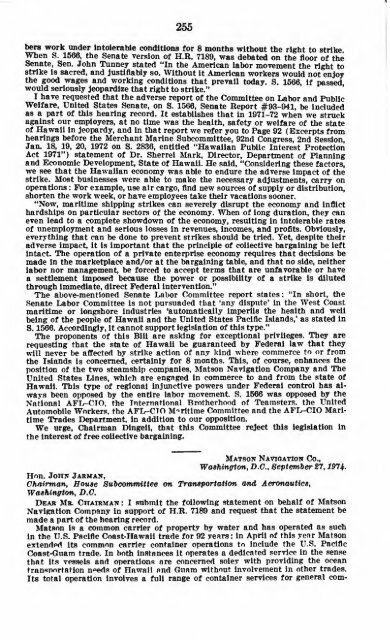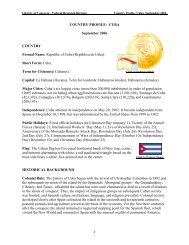1 - American Memory
1 - American Memory
1 - American Memory
You also want an ePaper? Increase the reach of your titles
YUMPU automatically turns print PDFs into web optimized ePapers that Google loves.
2BS<br />
bers work under Intolerable conditions for 8 months without the right to strike<br />
When S. 1566, the Senate version of H.B. 7189, was debated on the floor of the<br />
Senate, Sen. John Tunney stated "In the <strong>American</strong> labor movement the right to<br />
strike is sacred, and justifiably so. Without it <strong>American</strong> workers would not enjoy<br />
the good wages and working conditions that prevail today. S. 1566, if passed<br />
would seriously jeopardize that right to strike." '<br />
I have requested that the adverse report of the Committee on Labor and Public<br />
Welfare, United States Senate, on S. 1566, Senate Report #93-941, be included<br />
as a part of this hearing record. It establishes that in 1971-72 when we struck<br />
against our employers, at no time was the health, safety or welfare of the state<br />
of Hawaii in jeopardy, and in that report we refer you to Page 92 (Excerpts from<br />
hearings before the Merchant Marine Subcommittee, 92nd Congress, 2nd Session,<br />
Jan. 18, 19, 20, 1972 on S. 2836, entitled "Hawaiian Public Interest Protection<br />
Act 1971") statement of Dr. Sherrel Mark, Director, Department of Planning<br />
and Economic Development, State of Hawaii. He said, "Considering these factors,<br />
we see that the Hawaiian economy was able to endure the adverse impact of the<br />
strike. Most businesses were able to make the necessary adjustments, carry on<br />
operations : For example, use air cargo, find new sources of supply or distribution,<br />
shorten the work week, or have employees take their vacations sooner.<br />
"Now, maritime shipping strikes can severely disrupt the economy and inflict<br />
hardships on particular sectors of the economy. When of long duration, they can<br />
even lead to a complete showdown of the economy, resulting in intolerable rates<br />
of unemployment and serious losses in revenues, incomes, and proflts. Obviously,<br />
everything that can be done to prevent strikes should be tried. Yet, despite their<br />
adverse impact, it is important that the principle of collective bargaining be left<br />
intact. The operation of a private enterprise economy requires that decisions be<br />
made in the marketplace and/or at the bargaining table, and that no side, neither<br />
labor nor management, be forced to accept terms that are unfavorable or have<br />
a settiement imposed because the power or possibility of a strike is diluted<br />
through immediate, direct Federal intervention."<br />
The above-mentioned Senate Labor Committee report states: "In short, the<br />
Senate Labor Committee is not pursuaded that 'any dispute' In the West Coast<br />
maritime or longshore industries 'automatically imperils the health and well<br />
being of the people of Hawaii and the United States Pacific Islands," as stated in<br />
S. 1566. Accordingly, it cannot support legislation of this type."<br />
The proponents of this Bill are asking for exceptional privileges. They are<br />
requesting that the state of Hawaii be guaranteed by Federal law that they<br />
will never be afTected by strike action of any kind where commerce to or from<br />
the Islands is concerned, certainly for 8 months. This, of course, enhances the<br />
position of the two steamship companies, Matson Navigation Company and The<br />
United States Lines, which are engaged in commerce to and from the state of<br />
Hawaii. This type of regional injuncttve powers under Federal control has al-<br />
ways been opposed by the entire labor movement. S. 1566 was opposed by the<br />
National AFT/-CIO. the International Brotherhood of Teamsters, the United<br />
Automobile Workers, the AFL-CTO M'>ritime Committee and the AFL-CIO Mari-<br />
time Trades Department, in addition to our opposition.<br />
We urge. Chairman Dingell, that this Committee reject this legislation In<br />
the interest of free collective bargaining.<br />
MATSON NAVIOATION CO.,<br />
Washington, D.C., September 27, i974.<br />
Hon. JOHN JASMAN.<br />
Chairman, Bouse Subcommittee on Transportation and Aeronautics,<br />
Washington, B.C.<br />
DEAK MR. CHAIRMAN : I submit the following statement on behalf of Matson<br />
Navigation Company in support of H.R. 7189 and request that the statement be<br />
made a part of the hearing record.<br />
Matson is a common carrier of property by water and has operated as such<br />
in the U.S. Pacific Coast-Hawaii trade for 92 years: In April of this year Matson<br />
extended its common carrier container operations to Include the U.S. Pacific<br />
Coast-Guam trade. In both instances it operates a dedicated service in the sense<br />
that its ves.sels and operation's are concerned soley with providing the ocean<br />
transportation n»eds of Hawaii nnd Guam without involvement in other trades.<br />
Its total operation Involves a full range of container services for general com-



![Albert Einstein Papers [finding aid]. Library of Congress. [PDF ...](https://img.yumpu.com/21604228/1/190x245/albert-einstein-papers-finding-aid-library-of-congress-pdf-.jpg?quality=85)





![American Colony in Jerusalem Collection [finding aid]. Library of ...](https://img.yumpu.com/17941275/1/190x245/american-colony-in-jerusalem-collection-finding-aid-library-of-.jpg?quality=85)



![Piccard Family Papers [finding aid]. - American Memory - Library of ...](https://img.yumpu.com/17941234/1/190x245/piccard-family-papers-finding-aid-american-memory-library-of-.jpg?quality=85)


